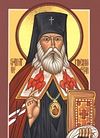

| Previous day | Next day |
| Old Style
February 3
|
Wednesday |
New Style
February 16
|
| Fast-free Week. Tone 1. | No fast.
|
![]() Afterfeast of the Meeting of Our Lord.
Afterfeast of the Meeting of Our Lord. ![]() Holy and Righteous Symeon the God-receiver and Anna the Prophetess (1st c.).
Holy and Righteous Symeon the God-receiver and Anna the Prophetess (1st c.). ![]() St. Nicholas, Equal-to-the-Apostles, enlightener of Japan (1912).
St. Nicholas, Equal-to-the-Apostles, enlightener of Japan (1912).
Prophet Azariah (10th c. в до Р.10th c..). Martyrs Papias, Diodorus, and Claudianus, at Perge in Pamphylia (250). Martyr Blaise of Caesarea in Cappadocia (3rd c.). Martyrs Adrian and Eubulus, at Caesarea in Cappadocia (ca. 308-309). St. Romanus, prince of Uglich (1285). St. Symeon, bishop of Polotsk and Tver (1289). St. Svyatoslav-Gabriel and his son St. Dimitry, of Yuriev (1253). St. Ignatius of Mariupol in Crimea, metropolitan of Gothia and Kafa (1786).
New Hieromartyrs Vladimir (Zagreba), hieromonk of Borisoglebsk Monastery (Novotorzhok), Basil Zalessky, archpriest, of Astrakhan, and Adrian Troitsky, archpriest, of Kazan (1938).
Martyr Paul the Syrian (284-305). St. Lawrence, archbishop of Canterbury (619). St. Werburga of Chester, abbess (ca. 700). St. Ansgar, bishop of Hamburg, enlightener of Denmark and Sweden (865). St. James, archbishop of Serbia (1292). St. Sabbas of Ioannina (15th c.). New Martyrs Stamatius and John, brothers, and Nicholas, their companion, at Spetses on Chios (1822).
Repose of Schemamonk Paul of Simonov Monastery (1825), disciple of St. Paisius (Velichkovsky), and Hieromonk Isidore of Gethsemane Skete, Moscow (1908).
Thoughts for Each Day of the Year
According to the Daily Church Readings from the Word of God
By St. Theophan the Recluse

Wednesday. [II Pet. 3:1–18; Mark 13:24–31]
The day of the Lord will come as a thief in the night (II Pet. 3:10). A thief in the night sneaks up when he is not expected. So will the day of the Lord also come when it is not expected. But when He that cometh is not expected, no preparations are made for meeting Him. Lest we allow such negligence, the Lord commanded: Watch: for ye know not what hour your Lord doth come (Matt. 24:42). Meanwhile, what are we doing? Are we watching? Are we waiting? We must confess that we are not. Some at least await death, but scarcely anyone awaits the day of the Lord. And it is as if they are right. Our fathers and forefathers waited, but the day did not come. Since we do not see anything, why should we think that it will come in our days? Thus, we do not think; and do not wait. It will not be a wonder, if with such a disposition as ours, the day of the Lord falls upon us like a thief. We shall be like the inhabitants of a city which the head of the province promised to visit in the near future. They waited for him an hour, waited another, waited a day and then said, “I suppose he’s not coming,” and went home. But as soon as they departed and gave themselves over to sleep—he appeared. It will be the same with us—whether we are waiting or not, the day of the Lord will come, and it will come without warning. For the Lord said: Heaven and earth shall pass away: but My words shall not pass away (Mark 13:31). But is it not better to wait, lest we be caught by surprise? For we will not get off without paying.
Articles
 Prophet AzariahThe name Azariah means “whom God helps.” The holy prophet lived during King Asa’s reign (2 Chron. 15:1). |
 Martyrs Papias, Diodorus, and Claudianus, at Perge in PamphyliaSaint Papias was martyred with Saint Claudianus at Perge, Pamphylia in 250. |
 Martyr Blaise of Caesarea, in CappadociaSaint Blaise of Caesarea lived in the third century. He was from Caesarea in Cappadocia (Asia Minor) and was a shepherd. |
 Martyr Adrian at Caesarea, CappadociaSaint Adrian of Baneas of Caesarea in Cappadocia. suffered martyrdom under Governor Firmilianus. |
 Martyr Eubulus at Caesarea, CappadociaSaint Eubulus, like Saint Adrian, was from Baneas, in Caesarea of Cappadocia. |
 St. Simeon the Bishop of Polotsk and TverSaint Simeon, Bishop of Tver was descended from the Polotsk princes. He was the seventh bishop of Polotsk and the first bishop of the Tver diocese. |






